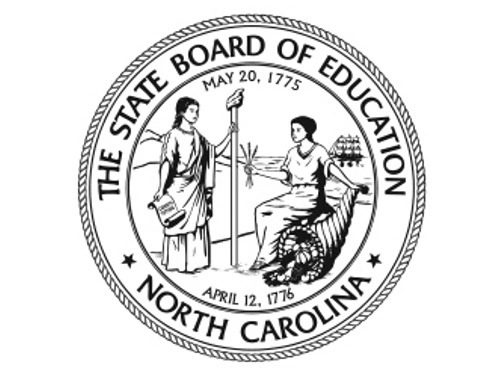
RALEIGH — At the close of the State Board of Education’s May 4 meeting, member Amy White announced her intention to resign her seat.
White called her service on the board “one of the highlights of my 30-year career of advocacy for students and families across the state of North Carolina.”
“While I could continue to serve in this position until Gov. (Roy) Cooper’s newest appointee is confirmed by both houses of the general assembly, I have made the decision to announce today my retirement of service to the board to refocus my passion my energy and my time on the Christian Ministry that I lead,” White told the board members.
White is the executive director of Community of Hope Ministries and she co-chairs the board’s Education Innovation and Charter Schools committee.
Board Chairman Eric Davis expressed shock at the announcement.
“Well, Ms. White, let me just say — that’s a stunner. We were not expecting that,” Davis said. “And yet many of us can share many of the feelings you’ve just expressed of the rewards and challenges of serving on this board.”
Davis also told White she had been a “marvelous member” of the board and that the board will celebrate her service during the June meeting.
White is the second member and Republican to resign from the board in the past year.
In February 2022, board member Todd Chasteen resigned, citing a “trajectory away from education and towards activism” in his resignation letter. Chasteen’s letter also referenced the passage of changes to the state’s social studies standards, which incorporated gender ideology and aspects of Critical Race Theory.
“In full transparency, in February when the board passed Social Studies Standards by a slim majority, standards that many of us concluded, and thousands of parents agreed, were unproductive, regressive, and unhelpful to the students of this wonderful state, it became more difficult to see where I could add value,” wrote Chasteen.
The governor had apparently appointed Chasteen’s replacement, John Blackburn of Linville, sometime in March 2022. Cooper’s office did not issue a press statement until early April after North State Journal began asking questions about the appointment.
White was appointed to the board for a seven-year term in June 2016 by former Gov. Pat McCrory. Her appointment was up at the end of March this year, but Cooper has yet to nominate her replacement.
Typically, the governor’s choice for the appointment has to be approved by both chambers of the General Assembly, but a resignation does not usually require that approval. However, in White’s case, she announced her resignation beyond her term’s expiration date, which means the governor’s pick to replace her is subject to legislative approval.
The State Board of Education is a 13-member body with three at-large appointees and eight members representing each of the state’s eight education regions.
The board is made up of the lieutenant governor and the state treasurer, along with 11 other members appointed by the governor who are confirmed by the legislature in a joint session. The 11 gubernatorial appointees serve eight-year terms.
While the board should have 13 members, one of the at-large seats has remained vacant under Cooper’s tenure, resulting in 12 voting members instead of 13. With the departure of White, that number will drop to 11.
Additionally, White’s retirement means Republicans will only have three members left on the board: Lt. Gov. Mark Robinson, Treasurer Dale Folwell and Olivia Oxendine.
A bill filed in the House sought to alter appointments to the State Board of Education, as well as its organizational structure.
House Bill 17 seeks to change State Board of Education members from appointed to elected positions and move the state superintendent as the board’s non-voting secretary to a voting member as the board’s chairperson.
While the full House did not pass the bill, it may still be viable despite the May 5 crossover deadline.
Crossover is the deadline by which bills need to be passed by their originating chamber to potentially become laws.
There are exceptions to the crossover deadline such as redistricting bills, elections bills, and gubernatorial appointments or nominations. Additionally, bills dealing with or appearing on the reports for the appropriations, finance or rules committees in either chamber are also not subject to crossover.
Per the General Assembly’s website, the last action on House Bill 17 was a referral to the Rules and Operations Committee of the House.



